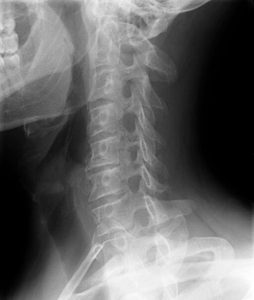 Neck pain is a common complaint that affects many people everyday. This intense pain can result from a number of injuries, disorders and or diseases. Many of these soft tissue type injuries are a direct result from contact sports, falls and motor vehicle accidents. Although not all neck pain is from a severe injury. You can sleep in a “weird” position and wake up with neck pain the next day. One of the most common neck complaints results from the neck muscles being strained from poor posture such as sitting at a computer all day or driving for long periods of time. This “hunched over posture” can lead to muscle tightness and imbalance. After years of wear and tear, the spine and joints in the neck or cervical region slowly begin to develop arthritis. This arthritis will result in stiffness, pain and limited range of motion in the cervical spine region. There are many different conditions that cause neck pain. Some of the most common conditions include—muscle strain, whiplash type injuries, herniated disc, pinched nerves and degenerative disc disease or arthritis. Below is a list of some of the more common neck conditions and injuries that we treat in our clinic everyday.
Neck pain is a common complaint that affects many people everyday. This intense pain can result from a number of injuries, disorders and or diseases. Many of these soft tissue type injuries are a direct result from contact sports, falls and motor vehicle accidents. Although not all neck pain is from a severe injury. You can sleep in a “weird” position and wake up with neck pain the next day. One of the most common neck complaints results from the neck muscles being strained from poor posture such as sitting at a computer all day or driving for long periods of time. This “hunched over posture” can lead to muscle tightness and imbalance. After years of wear and tear, the spine and joints in the neck or cervical region slowly begin to develop arthritis. This arthritis will result in stiffness, pain and limited range of motion in the cervical spine region. There are many different conditions that cause neck pain. Some of the most common conditions include—muscle strain, whiplash type injuries, herniated disc, pinched nerves and degenerative disc disease or arthritis. Below is a list of some of the more common neck conditions and injuries that we treat in our clinic everyday.
-
- Neck Strain—Is a tear of the muscle or tendon, which will cause the neck musculature to go into spasm. This pain may start right away or come on after a few hours or days after the initial injury. As the spasm progresses, it will begin to feel tight and be very tender to the touch. These muscle spasms can sometimes lead to tension headaches, which can mimic migraines. These types of injuries usually occur when the head is forcibly moved from one position to another. This is very common with a “Whiplash type injury” such as from an auto accident or from a contact sport. Strains can also occur from sleeping in an awkward position for a long period of time. Poor posture while sitting at a desk working on the computer can also cause a muscle strain.
-
- Disc Herniation—Is due to nerve root irritation often following a neck injury. The pain or radiation can travel down the neck into various areas of the upper and lower arm. This type of injury will cause the cervical disc to swell, bulge or protrude which will then add pressure to the nerve in that area. This pressure on the nerve can cause radiating pain to various area of the upper body. An individual with a disc herniation will often have a past history of neck pain sometimes resulting from multiple minor injuries to that area. Usually this pain is described as a deep ache that is worse with certain movements of the neck– depending on the direction of the disc herniation. As a disc herniation increases or protrudes more from its original area, this can lead to muscle weakness in the arm and hand along with various changes in skin sensation. The best way to determine the extent of a disc herniation is to get an MRI. This test will show all soft tissue abnormalities and the extent of the disc damage.
-
- Pinched Nerve / Radiculopathy— A pinched nerve can occur for multiple reasons. Some of the most common are muscle spasms, disc herniations, and subluxated vertebrae’s. This type of condition is a result of too much pressure being applied to a nerve by its surrounding structures. These structures can include tissue, bones, cartilage, muscles and tendons. This increase in pressure will interrupt the nerve’s function leading to pain, tingling, and numbness. If this pressure is long term it can result in weakness and muscle atrophy.
-
- Burner/Stinger—This painful condition results in a burning pain or numbness down the outside of the arm, which is usually followed by muscle weakness in the arm and hands. A “burner” or “stinger” is very common in sports and occurs when the athlete is hit from the side and the neck laterally flexes. This overstretch of the neck creates tension on the brachial plexus nerve roots and will cause a radiating pain down the arm. A majority of the time this pain will only last for a few minutes then go away. This is often seen in football due to the nature of the hits and tackles.
-
- Torticollis–is a painful neck condition in which the muscles of the cervical spine involuntarily contract without any type of trauma. The main muscle involved in this condition is the Sternocleidomastoid or SCM muscle for short. This specific muscle spasm will cause your head to flex and rotate to one side. The head will be fixed in this position until the muscle releases. This can last anywhere from hours to weeks depending on the severity of the spasm. This condition usually occurs in the morning after the person has awakened from a night of sleep and can affect people of all ages, even babies.
-
- Cervical Spine Arthritis–is basically inflammation to the joints of the cervical spine region. Arthritis will cause symptoms of joint pain and stiffness in the neck region. Range of motion of the neck will tend to decrease over time as the cartilage in the joint spaces begins to deteriorate. Arthritis will generally get worse or increase as the person age increases. The best way evaluate the joint space and to determine if there is any arthritis in the joint is to take a plain film x-ray. From this you can monitor the joint space and see the rate of deterioration. Arthritis is usually categorized into 2 different classifications. The most common types are osteoarthritis and rheumatoid arthritis. Osteoarthritis is usually due to normal wear and tear in the joint and will occur in most weight bearing joints over time. Rheumatoid arthritis is an autoimmune disorder, which, can be diagnosed through various blood test.
There are various other causes of neck pain out there but they are not as common as the conditions listed above. These conditions listed are the most common injuries that present to our office as well as many of the other offices around San Diego. Once an accurate diagnosis is made the most important thing is how you treat your neck pain.
Diagnosing Neck Pain: I cannot speak for all clinics that treat neck pain but in my experience diagnosing it accurately is straightforward. During the initial examination I perform a series of manual orthopedic and neurological tests that can differentiate between the most common conditions. These tests are sometimes referred to as “provocative” tests as they are intended to provoke the pain slightly which helps accurately diagnose the condition. These orthopedic and neurological tests help to differentiate between the various conditions and arrive at an accurate diagnosis. Typically, neither X-rays nor MRI’s are necessary to accurately diagnose a patient’s condition. In the cases of trauma X-rays might be used to make sure the patient has not fractured their spine but if discs or soft tissue injury is suspected X-rays are of little use. If an MRI is warranted we either order the MRI through the patient’s insurance or send them to a facility that we have a cash plan with. Surprisingly MRI’s can be done for as little as $500!
Treating Neck Pain: Once an accurate diagnosis is reached a proper treatment protocol is recommended to the patient. It is not unusual to provide the patient with multiple treatment options ranging from the most conservative (do nothing) to the least conservative (have surgery). In fact, very few patients require neck surgery except in the most serious of situations. Our job is to help you avoid neck surgery and we are very good at that. I like to take an all-inclusive approach (“kitchen sink”) when treating someone with neck pain. Treatments usually include
- Therapeutic Ultrasound
- Electrical Stimulation
- Gentle Spinal Adjustments
- Corrective Exercises to restore muscle balance
- Correction of any asymmetries
- Home stretching and strengthening programs
- Home self massage routines
It both necessary and crucial to involve the patient not only in understanding their neck condition but in participating in fixing it by doing as much work at home, on his or her own, as possible. By doing the home stretching and strengthening routines patients can often avoid numerous trips for therapy.
If you suffer from either acute or chronic neck pain and would like to receive an accurate diagnosis and treatment options please call our clinic today. Our office number is 858-268-8525. If you prefer to get more information before calling you can email Dr. Allen D.C. directly at drallen@sdri.net. Feel free to ask any questions you have and allow for 1-2 days to receive his response.

